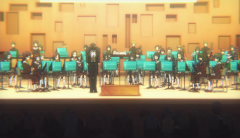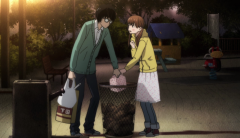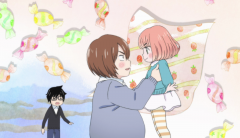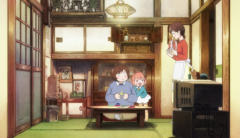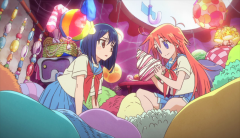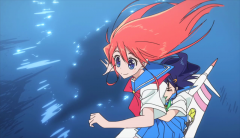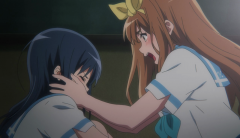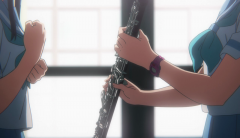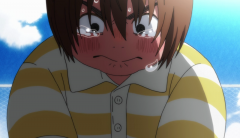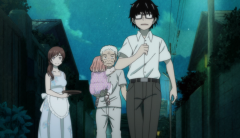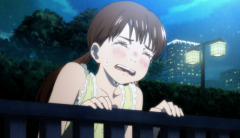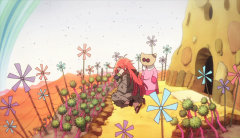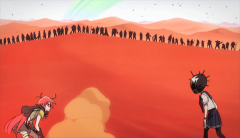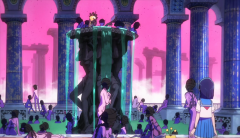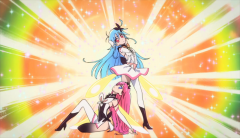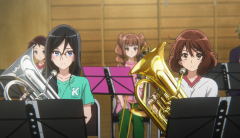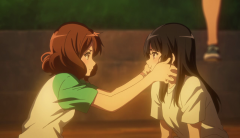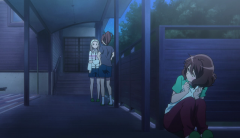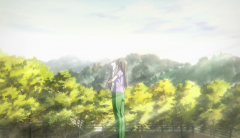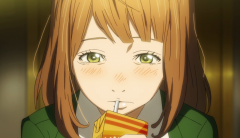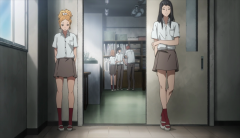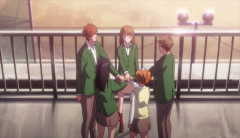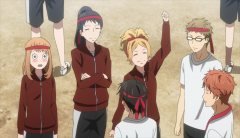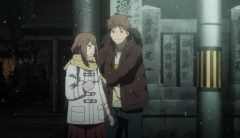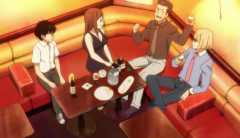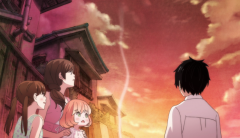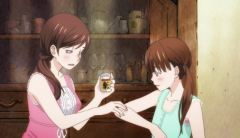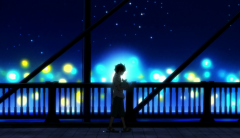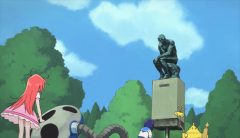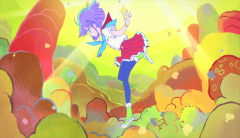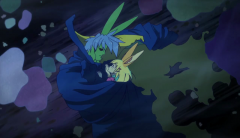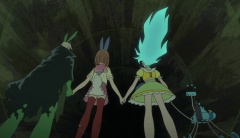What a bravura piece of performance! Usually if a show wants to showcase how good a music performance is, they’d go for cheap tactics like fast cuts, over-the-top sparkling effects, key still frames, and drawing reactions from audiences. Not with KyoAni. They’re confident enough, and of course talented enough, to play out the entire piece and let that speaks for themselves about the quality. This is easily the highlights of this season so far and will be the one that fans will keep coming back to.
But the first half by no mean is no duds either. By following Kumiko and the band go through a day leading up to the Kansai Competition, the show again excels in showing many subtle moments and development that blink and you might miss it entirely. First, Taki announces to the band that his friends’ duty has ended, which for me was quite sudden because I still don’t know what their real roles are in the whole picture. I think the reason they are presented is to support and shed more lights to Taki’s character, but they actually didn’t do much except being either an info-dumper, or an obvious setup for Reina to get fired-up nonsensically. I hope they’ll be back soon as I still don’t see the show used them to their full potential. While on the train, Hazuki (who sadly was under-developed this season) gives a really light but on-point touch on what she is thinking the upcoming tournament. Being one of a few who isn’t qualified enough, it’s understandable that she sometimes feels like she was left behind by her friends. But being Hazuki, obviously she’s sad, but she isn’t the one who’d disheartened by that. Instead, she vows to work hard to get her place for next year, and encouraging her friends to make it to the Nationals so that would inspire her is a really nice characterization by the show. Aiming to the Nationals not only mean a whole lot for the competitive members, but for the rest of the team as well.
When Kumiko got back home that afternoon, she receives a phone call from her middle school friend, Azusa (who briefly appeared in the first season). Her school Rikka High School will compete in the morning, moreover she asked Kumiko to not to speak with her that day. That again is a nice touch from Sound Eupho because the show keeps adding more perspectives from other cast, making more layers to the story. I totally agree with Azusa here, they might be ‘best friends forever’ but on that one day they’re competitors (I love how Kumiko keeps picking up her toes), and like Kumiko later said the amount of time and efforts all of them put in to practice for that one day affects pretty much everyone in the band, so “no one can think straight now” isn’t an overstatement at all.
I have to give it up for Yuuko for again being shine in her brief moments. She basically acts like herself this episode but the moment feels truly earned. Although qualifying to the Nationals is their goals, the team (especially the third-year students) knows that it’s a hard goal to reach. In addition, for the third-year students, this might be their last performance so they sometimes feel like they’re at the end of the road. This sentiment is echoed by Kaori this week as she tells Yuuko to keep looking after then band or Asuka last season when she said that the fun of practicing is about to conclude when the competition ends. But Yuuko points out correctly that their journey isn’t going to be done yet, let’s try and reach the Nationals together. In other notes, while Sound Eupho never really a show that is strong in terms of comedy, this episode has its absurd moments. Upon hearing Yoroizuka saying that the she will play a solo piece for Nozomi (which still doesn’t sound right for me either), Reina asks Kumiko if she can play the solo part for her. I know Reina isn’t the one who is easily affected by other people so this is really more like the show poking fun on the very notion of playing the piece for someone else. In fact, the very last moments of the episode when Yoroizuka expresses that she’s happy with the competition sadly is the weakest part in otherwise flawless episode for me, as I see for much of her struggle, she comes out as too clean a cut, the drama of her last episode pretty much resolved everything that I don’t feel her grow is natural at all.
But this first half’s best moments come directly from the speech of Asuka. As this show has many times addressed this issues, while Asuka isn’t the president of the club, she has a leader traits and clearly everyone sees her as more influential figure than Haruka the president. This time, she speaks up for the whole band and for once, she lets herself loose and being direct in front of everyone. She wants to try to reach to the Nationals. I noticed the brief exchanges between her and Kumiko during the performance and at this moments I’m not really sure what those exchanges supposed to be. The very nature of concert band is teamwork as everyone contribute their parts to form a collective whole, but for those from the same sections sometimes it means they have to fight each other for the roles. This will put our main Kumiko in an interesting position as Asuka and she both playing Euphonium. I reckon Asuka and Kumiko relationship is going to be the main focus for the latter half of this season, which I will totally be on board.
And now to that wonderful second half performance, it’s just simply mesmerizing. KyoAni always has been very consistent when it comes to the production values, but even with their standard the performance is still a standout. I noticed they used some footages from the previous performance last seasons, but overall the whole performance flows magnificently. Some might say it’s not fair to just focus on the band’s performance so we don’t know how good other bands are, but that’s essentially the point here. When the announcement starts, we’re rooting for them not because how incredible their performance was, but because we have witnessed how hard they tried to produce that piece of music so the results are satisfying because we know they deserved it. And you deserved it too, KyoAni.



